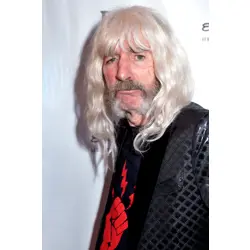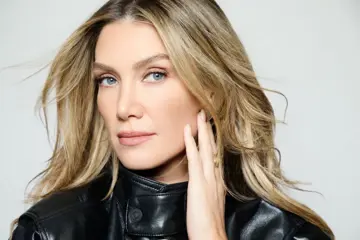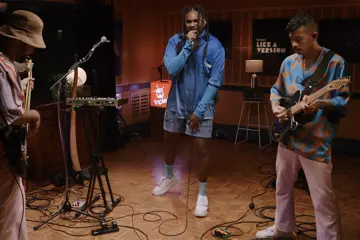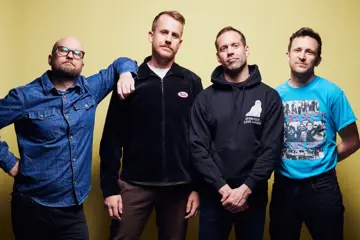 Derek Smalls
Derek SmallsHe once provided the big bottom end for British heavy metal gods Spinal Tap - for decades playing the pivotal role of lukewarm water between the fire-and-ice of his elemental bandmates David St Hubbins and Nigel Tufnel - but now legendary bassist Derek Smalls is going the solo route with his latest album, Smalls Change (Meditations On Ageing).
After one false start with his long-abandoned It's A Smalls World project in the '70s and freed from the constraints of his day job in the now-hibernating behemoth Spinal Tap - who leapt to fame on the back of their cult 'tell-all' 1984 documentary This Is Spinal Tap - Smalls has gathered together a distinguished and wide-ranging array of collaborators to help him mould his wisdom and worldview into song form, including David Crosby, Joe Satriani, Steve Vai, Peter Frampton, Donald Fagen, Dweezil Zappa and countless more big names.
The Music catches up with the affable veteran in the midst of a London promo jaunt and we express our gratitude that we've finally been gifted this solo foray. Smalls explains the pivotal role of a little-known music industry body in getting the whole thing off the ground. "Thank you very much, it was fun working on it," he offers effusively. "As a matter of fact one of the reasons that I'm in London is I had a dinner last night held by The British Fund For Aging Rockers - which made the record possible - and they gifted me with what the Americans would call a 'golden courgette'. I don't know what you call it, I think maybe a zucchini?
"It's a lovely trophy and I think it's going to be an annual award called 'The Derek' for an aging rocker they salute, or it's just a joke on me - I can't be sure. It was a pleasure to receive it and an even bigger pleasure to award it, I imagine."
Don't miss a beat with our FREE daily newsletter
While slightly unsure of the motivation behind last night's presentation, Smalls is certainly glad that he has The British Fund For Aging Rockers' support.
"It's been essential," he continues. "It's one of the good things that came out of austerity that they got the money and I was plucked to get the award. I applied and then I got plucked: it's a two-part process."
It's been hard for Smalls to step out from Spinal Tap's enormous shadow, but apparently being frontman in his own band has its benefits. "I put it in the terms of the stage," he reflects. "I would always stand not all the way back, but I was nearer the drummer du jour than I was the other lads, and every once in a while I'd get to sing a tune of my own or one that David wrote for me.
"And as you get older you get a bit more sensitive to the cold, and I realised, 'Oh, my God It's so much warmer in the big light than in the little light I was getting at the back of the stage,' so I was, like, 'Right, let's do this, let's get in the warmth'. So I went for the warmth and the music followed."
It must be weird not having the familiar silhouettes of St Hubbins and Tufnel either side (and slightly to the front) of him, though.
"Yeah, it is," he concedes. "As I say in the title song, 'But lukewarm water/It still has to flow'. I did a mystery gig last year at the GroundUP Festival in Miami Beach, which was the first time I'd appeared as a leader, and I had the lads from Snarky Puppy behind me. So the first time I looked around and saw - and I'm going to use a term of endearment here - 'real musicians' it was a good feeling.
"And they were just egging me on like crazy: they weren't actually saying, 'Go Derek, go!' but I could see it in their eyes."
When it came time to craft what would become Smalls Change, the four-string icon admits to having a clear view of what he wanted from the opus. "The songs came from a vision and the vision then had to be translated into sound obviously because you can't just sing a vision," he explains. "Although I would like to try that one day; it could make an interesting experiment. But I had this idea in my head, and it went like this [20-second pause], 'Everybody's either dead or getting older,' and I didn't want to write about the dead. We're all getting older, I just had to be at the vanguard; at the sharp end of the pointy stick.
"So then the ideas began to flow left and right - about me and about people I knew and how during aging things are taken from you and things are given to you, and how when you're older you can look back. So I'm looking back at the age of rock at its zenith, when men did rock; it was what seemed a towering moment in the history of popular music. So, yes. The answer is yes."
A lot of rockers tend to cling onto their youth for dear life, but in heartfelt songs like Rock And Roll Transplant, It Don't Get Old, MRI, Hell Toupee and She Puts The Bitch In Obituary Smalls has not only embraced the aging process but he's also incorporated it into his art.
"As I said, although I haven't said it yet to you today, if you're singing about something that's true then you bring more passion about it and you bring more knowledge to the writing of the lyrics than if you're just making stuff up," he states sagely. "And if you could see the way that I look it would be a bit silly for me to cling to my youth - I don't look like my youth; I look like my craggy, aged self - so I'm aging gracefully."
Then there's songs like Butt Call, a savage takedown of the butt-dialling epidemic that is far more universal in tone. "It's a bit universal," Smalls ponders. "In a way, it's an observation by a cranky, aging rocker whinging about specific things that happened to him, so it fits the term loosely, but everybody's had that happen to them. But if you write about the personal it automatically becomes universal - that's the magic trick you learn when you're in a band."
Does Smalls enjoy passing on such profound insight and life experience? "Yeah, I find it almost relaxing," he smiles. "I find it liberating as it's stuff I don't have to moan about anymore. Once I've put it down on paper - or down on computer, because we don't use paper anymore - I can go about my life. I haven't bitched about a butt call since I wrote that song, for example; I got it out of my system and hopefully into yours."
In the terms of the musical diversity displayed throughout Smalls Change..., while the bassist is usually associated with hard rock and metal due to the halcyon days of Spinal Tap, he's always enjoyed a broad range of musical styles.
"Well, I mean [Spinal] Tap had a great range," he says. "If you think about the song that Nigel wrote about Stonehenge that was a very moody, almost proto-folky kind of song, and I wrote an inspiring anthem called Just Begin Again, which is an orchestral number about how you have to take the good with the bad, aimed at that group of people who outnumber the winners by a large margin: ie. the losers. So that range has always been within me, it's just never had the room to express itself until now.
"But I do think that the metal/hard rock niche was where we held court commercially as well as spiritually for a while and it is home to me, but even if you live at home you've got to visit other places and experience them and their music and embrace them - that's what it's all about, isn't it? Well, what part of it is all about."
Smalls is modest about the calibre of guests he was able to entice onto his album, denying that people were throwing themselves at him to be involved. "Not many people were thrown in the process, to be honest," he recalls. "But I reached out - as they say now - to people I'd met and people I knew and people I knew that I'd met, and I think it was just an experience of generosity - of overwhelming generosity - in their response.
"And that generosity just imbues the process of getting all these amazing people in to guest with us: great, great drummers, great guitar players and wonderful vocalists. It's a thrill, really - for them, mainly - and, as I say, it's the generosity of their response which leads me to say this now."
There were indeed some great drummers helping out on skins, including Chad Smith (Red Hot Chili Peppers) and Taylor Hawkins (Foo Fighters) to name just a couple. But given the propensity of Smalls' rhythm section partners from Spinal Tap to die in increasingly mysterious circumstances, did any of them express reservations about getting involved?
"No, it's interesting," Smalls offers. "The first few - we took out insurance cover on them just to keep them at ease, we had policies which covered them for the entire session. But I'm going to say something that's maybe a little bit dangerous, but all of the drummers who have played on this record are so far in excellent shape.
"So, if anything, there may have been a curse that attached to the band but not to the individual members thereof, at least in our case. In fact, there may even be a reverse curse because some of them said they've never felt better."















